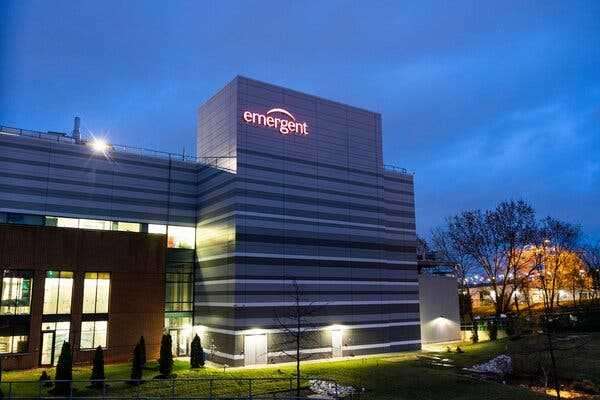A report sheds new light on Emergent executives’ own worries about deficiencies in the company’s quality control systems at its troubled Baltimore plant; no contaminated doses were ever released to the public.

Millions of doses of the Johnson & Johnson coronavirus vaccine were ruined in the Baltimore manufacturing facility of Emergent BioSolutions.
WASHINGTON — Emergent BioSolutions, a longtime government contractor hired to produce hundreds of millions of coronavirus vaccine doses, hid evidence of quality control problems from Food and Drug Administration inspectors in February 2021 — six weeks before it alerted federal officials that 15 million doses had been contaminated.
The disclosure came in a new report by the Democratic-led House Committee on Oversight and Reform. The report, based on internal company emails, documents and interviews, sheds new light on Emergent executives’ own worries about deficiencies in the company’s quality control systems at its troubled Bayview plant in Baltimore.
The report, released Tuesday morning by the House and the Select Subcommittee on the Coronavirus Crisis, said that all told, nearly 400 million doses of coronavirus vaccine manufactured by Emergent had to be destroyed “due to poor quality control,” including about 240 million doses in late 2020 and early 2021. Previous estimates of lost vaccine were far lower; no contaminated doses were ever released to the public.
“These doses were squandered despite repeated warnings from employees, outside consultants, pharmaceutical companies and F.D.A. regulators that the company’s manufacturing practices were unsafe,” Representative James E. Clyburn, Democrat of South Carolina and the chairman of the House subcommittee on the pandemic, said in a statement.
The New York Times reported last year that a top pandemic preparedness official with Operation Warp Speed, the Trump administration’s fast-track vaccine initiative, warned in June 2020 that relying on the plant would present “key risks” and that the site would “have to be monitored closely.”
The same month, an Emergent executive, Sean Kirk, acknowledged in an email that he had alerted other senior executives “for a few years” about problems at the plant, writing that “room to improve is a huge understatement.”
In another email, which he wrote to Robert Kramer, the company’s chief executive, Mr. Kirk said, “Of all the things we have to deliver on OWS,” referring to Operation Warp Speed, “the thing that keeps me up at night is overall perception of state of quality systems at bayview.” Mr. Kirk has since left Emergent.
A spokesman for the company, Matt Hartwig, said in an email on Monday night that Emergent had been “open and forthcoming” with the F.D.A. and Congress, noting that the company had provided investigators with thousands of documents and invited them to tour its facilities. Emergent executives also testified in public before the House subcommittee last May.
“Emergent remains committed to being a trusted partner of the U.S. and allied governments,” Mr. Hartwig wrote, adding that the company had not yet seen the House report.
As the federal government scrambled to secure vaccine manufacturing capacity during the early days of the pandemic, it entrusted Emergent with a mammoth task — producing both Johnson & Johnson’s and AstraZeneca’s vaccines at its Baltimore facility. The company’s stock price soared on the announcement of a $628 million federal contract and on additional deals with the two drugmakers worth a combined $656 million.
But the documents released by the House investigators show that some of Emergent’s own managers feared the company was not up to the task.
In advance of a visit to the plant by F.D.A. officials in September 2020, a senior quality director warned executives that it would be critical to convince the agency that rapid improvements were underway. “We are not in full compliance yet- BUT- we are making batches NOW,” the director wrote.
In November 2020, one outside consultant to Emergent wrote that the firm’s manufacturing deficiencies constituted “a direct regulatory risk.”
During the September visit, the agency noted deficiencies. When officials returned in February 2021, Emergent employees sought to hide potential problems, according to the House report.
Previously, Emergent had placed yellow tags on containers holding part of a batch of Johnson & Johnson’s vaccine that was suspected to have quality problems. But employees removed the tags shortly before the F.D.A. visit and put them back on after the agency officials had left. Senior managers and an executive vice president of the company were aware of those actions, the House report found.
In an email obtained by the committee, an outside consultant to Emergent wrote that the purpose of removing the tags appeared to have been to “avoid drawing attention” to the potentially problematic containers.
House investigators wrote that “despite this apparent attempt to impede oversight,” the F.D.A. still identified serious quality concerns, but granted Emergent some leniency. In late March 2021, Emergent notified the Department of Health and Human Services about the contaminated doses. That set off a series of events that culminated with the Biden administration terminating Emergent’s vaccine production contract in November 2021.
Source: nytimes.com



